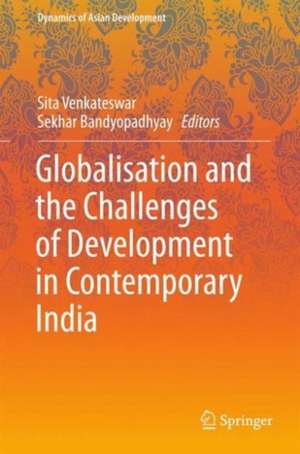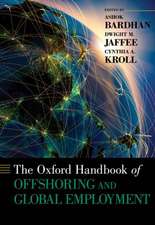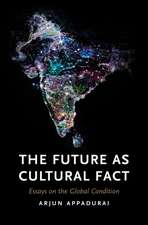Globalisation and the Challenges of Development in Contemporary India: Dynamics of Asian Development
Editat de Sita Venkateswar, Sekhar Bandyopadhyayen Limba Engleză Hardback – 30 mar 2016
Preț: 899.38 lei
Preț vechi: 1096.80 lei
-18% Nou
Puncte Express: 1349
Preț estimativ în valută:
172.12€ • 176.26$ • 143.17£
172.12€ • 176.26$ • 143.17£
Carte disponibilă
Livrare economică 26 februarie-12 martie
Preluare comenzi: 021 569.72.76
Specificații
ISBN-13: 9789811004537
ISBN-10: 9811004536
Pagini: 317
Ilustrații: XIII, 270 p. 10 illus. in color.
Dimensiuni: 155 x 235 x 21 mm
Greutate: 0.69 kg
Ediția:1st ed. 2016
Editura: Springer Nature Singapore
Colecția Springer
Seria Dynamics of Asian Development
Locul publicării:Singapore, Singapore
ISBN-10: 9811004536
Pagini: 317
Ilustrații: XIII, 270 p. 10 illus. in color.
Dimensiuni: 155 x 235 x 21 mm
Greutate: 0.69 kg
Ediția:1st ed. 2016
Editura: Springer Nature Singapore
Colecția Springer
Seria Dynamics of Asian Development
Locul publicării:Singapore, Singapore
Cuprins
Chapter 1. Globalisation and the Challenges of Development: An Introduction- Sekhar Bandyopadhyay and Sita Venkateswar.- Section 1: Framing the Macro environment.- Chapter 2. Compressed Capitalism, Globalization, and the Fate of Indian Development.- Chapter 3. India’s Economic Performance in the Post Reforms Period: A Tale of Mixed Messages.- Chapter 4. Post-Industrial Development and the New Leisure Economy.- Section 2: Food Security.- Chapter 5. India’s Evolving Food and Nutrition Scenario: An Overview.- Chapter 6. Millet in Our Own Voices: A Culturally-Centered Articulation of Alternative Development by DDS Women Farmers’ Sanghams.- Chapter 7. Beyond Basmati: Two Approaches to the Challenge of Agricultural Development in the ‘New India'.- Section 3: Activism, Development and Changing Technologies.- Chapter 8. Investment-Induced Displacement and the Ecological Basis of India’s Economy.- Chapter 9. Urban Neoliberalism and the Right to Water and Sanitation for Bangalore’s Poor.- Chapter 10. Bastis as “Forgotten Places” in Howrah, West Bengal.- Chapter 11. ICT4D and Empowerment: Uneven Development in Rural South India.- Chapter 12 Paradigms of Digital Activism: India and its Mobile Internet Users.- Section 4: Conclusion.- Chapter 13. Approaching Contemporary India: the Politics of Scale, Space and Aspiration in the Time of Modi.
Notă biografică
Sita Venkateswar is a socio-cultural anthropologist in the School of People, Environment and Planning, Massey University and Associate Director, Massey chapter, New Zealand India Research Institute, New Zealand. Her research documents the ways academic practices can be responsive to social inequities and she incorporates critical feminist scholar-activist research methodologies, designated as Public Anthropology, informed by feminist and postcolonial theories. She uses a comparative and reflexive anthropological lens to address issues of internal colonialism, gender, poverty, social oppression and structural violence within the postcolonial and neoliberal contexts of South Asia. Her ethnography Development and Ethnocide: Colonial Practices in the Andaman Islands (2004) is based on her PhD fieldwork in the Andaman Islands from 1989 to 1992 funded by the National Science Foundation Dissertation Improvement Grant. Her co-edited book, The Politics of Indigeneity: Dialogues and Reflections on Indigenous Activism (2011) published by Zed Books. Her current research explores multi-species approaches to food resilience that focuses on millet cultivation in India.
SekharBandyopadhyay is Director, New Zealand India Research Institute, Schoolof History, Philosophy, Political Science & International Relation, NewZealand. Sekhar Bandyopadhyay is Director of the New Zealand India Research Institute and Professor of Asian History at Victoria University of Wellington. His academic specialisation is in social and political history of colonial and postcolonial India. He has also written on the Indian diaspora and India-New Zealand relations in historical times. He has published seven books, eight edited or co-edited books, and more than fifty book chapters and journal articles. In 2009 he was elected a Fellow of the Royal Society of New Zealand. In 2014, for his book Decolonization in South Asia: Meanings of Freedom in Post-independence West Bengal, 1947-52, he was awarded the Rabindra Smriti Puraskar by the Bangla Academy, Government ofWest Bengal.
Textul de pe ultima copertă
This volume bringstogether multidisciplinary, situated and nuanced analyses of contingent issuesframing a rapidly changing India in the 21st century. It moves beyond the readydichotomies that are often extended to understand India as a series ofcontrasts and offers new insights into the complex realities of India today,thereby enabling us to anticipate the decades to come.
The editors focus on threemajor themes, each discussed in a section: The first section, Framing theMacro-Economic Environment, defines the framework for interrogatingglobalisation and socio-economic changes in India over the last few decades ofthe 20th century spiraling into India in the 21st century. The next section,Food Security and Natural Resources, highlights critical considerationsinvolved in feeding a burgeoning population. The discussions pose importantquestions in relation to the resilience of both people and planet confrontingincreasingly unpredictable climate-induced scenarios. Thefinal section,Development, Activism and Changing Technologies, discusses some of the socialchallenges of contemporary India through the lens of inequalities and emergentactivisms. The section concludes with an elaboration of the potential and promiseof changing technologies and new social media to build an informed and activecitizenry across existing social divides.
The editors focus on threemajor themes, each discussed in a section: The first section, Framing theMacro-Economic Environment, defines the framework for interrogatingglobalisation and socio-economic changes in India over the last few decades ofthe 20th century spiraling into India in the 21st century. The next section,Food Security and Natural Resources, highlights critical considerationsinvolved in feeding a burgeoning population. The discussions pose importantquestions in relation to the resilience of both people and planet confrontingincreasingly unpredictable climate-induced scenarios. Thefinal section,Development, Activism and Changing Technologies, discusses some of the socialchallenges of contemporary India through the lens of inequalities and emergentactivisms. The section concludes with an elaboration of the potential and promiseof changing technologies and new social media to build an informed and activecitizenry across existing social divides.
Caracteristici
Provides directions to understand 21st century Indian developmental challenges beyond stereotypes Includes multidisciplinary contributions by India scholars from New Zealand, Australia and the Provides cutting edge andcontextual analyses of contingent socio-economic issues in India Includes supplementary material: sn.pub/extras






















